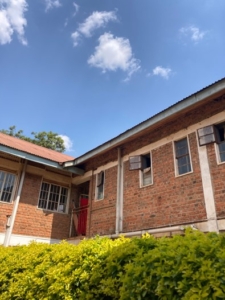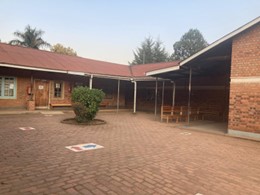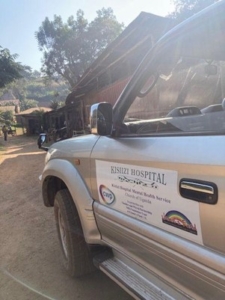Kisiizi Hospital, Uganda, Katie May Adams & Julie-Ann Amartey, July 2023


Julie-Ann – 4th Year medical student
I spent my time in Kisiizi split between the Paediatric Ward, Maternity and Gynae wards. I had a great time.
Obstetrics & Gynaecology
Ward rounds typically started in the gynae ward which usually had a range of patients with different presenting complaints. One thing to note is that in Kisiizi, they often interchange miscarriage and abortion. Abortion is illegal in Uganda however women use other means to abort which can be very dangerous to their lives. The maternity ward was always full and packed with women and babies. I was able to examine and write in the notes during ward round. Women are encouraged to give birth in hospital and Kisiizi has a Mothers Waiting Home where for a small fee, women who do not need to be admitted, can stay on hospital grounds until birth with weekly visits from the doctors. C-sections happen often in Kisiizi as the pricing is one of the most affordable in the area. Doctors are happy for you to scrub in and assist them as most junior doctors in Uganda know how to do a C-Section.

Paediatrics
The paeds ward was a busy place with sick children and their mothers. I was clerking the patients with a translator. I was also able to discuss management plans with the doctor and really felt part of the team. Ward rounds were often long as we also had to cover the SCBU (Special care baby unit) and the NICU (neonatal intensive care unit), however it was a great learning experience.
Katie – 4th Year medical student
Internal Medicine
The medical ward has 2 levels, one for infectious patients (TB, immunosuppressed with HIV) and then a general ward with a male bay, a female bay and a HDU (which just means they are always in view of a nurse and more frequent obs, with quite limited interventions). Patients are 13 and above, which means you do get some paeds! Ward round involves going around all the patients (similar to UK) and notes are taken on a laptop. Most/all jobs are done by the nursing staff, and writing notes is a good way to get involved. Unfortunately, patients often present later and so conditions can be more advanced and clinical signs more present.
Outpatients and A&E

Main outpatients is a bit of a mix of GP and A and E, in that patients come, wait to be seen by a doctor, get sent for same day ultrasounds, CXRs, bloods or urinalysis, and then get reviewed again by the doctor. It was a good opportunity to see a variety of conditions, and the interplay between money and healthcare. You can get involved writing notes and examining patients. Consultations are usually in the local language but all medical notes are written in English, and the staff are really kind in translating so you can follow what’s going on, and some doctors like to ask you lots of questions and keep you on your toes.
They also have specialised surgery, ophthalmology, paeds, diabetes, etc clinics, and a 24 hour small A and E service.
Psychiatry
Kisiizi also has a psychiatric unit where it looks after many short and long term patients. There also do outreach in surrounding villages, which you can go along to, and they have clinics at the hospital. We went a couple of times for some singing and testimony time and were warmly welcomed.
Another unique feature is their rehabilitation unit, where they offer in-patient rehabilitation for children and adults. This work can be really life changing in a community where living with disability can be really challenging and access to physio and OT is so limited. You are always welcome as students and they get you involved doing exercises with patients!

Becca – 2nd Year medical student
I went to Kisiizi in between my 2nd and 3rd year of medical school so my exposure to clinical placement in the UK was very limited at the time I went. This meant that the learning curve for me was massive! I decided that it was most beneficial to spend a few days on each specialty and mainly shadow the ward rounds while I was out there to get a flavour of everything.
Theatres
I particularly enjoyed my time in theatre, where I was able to scrub in and assist for the first time. I enjoyed the fact that patients were prayed for before surgery started and the use of reusable gowns and aprons I thought was particularly economical and environmentally friendly. For me being able to just see things I had only read about was amazing and the staff were brilliant at answering any questions and getting me involved.

Final thoughts
For anyone considering going to Kisiizi, we would highly recommend it. You feel so welcomed and there is a real sense that everyone wants better care for their patients and is striving for excellence even with what little resources they have. The guest house accommodation is excellent and makes your stay and integration into Ugandan life extremely smooth. Get stuck in with getting to know the local customs too and you will find you get so much out of your stay. We also attended a home group held in the rehab centre on a Wednesday evening and the fitness sessions in the evening. Chapel takes place every weekday morning and attendance is encouraged but not mandatory.
Kisiizi have a really good guide about doing an elective on their website so for more info check there. Some good things are that up to 6 students can be there at any time and non-Christian friends are welcome. We hope you enjoy your time in Kisiizi.
Feel free to email me: julieann.amartey@gmail.com

